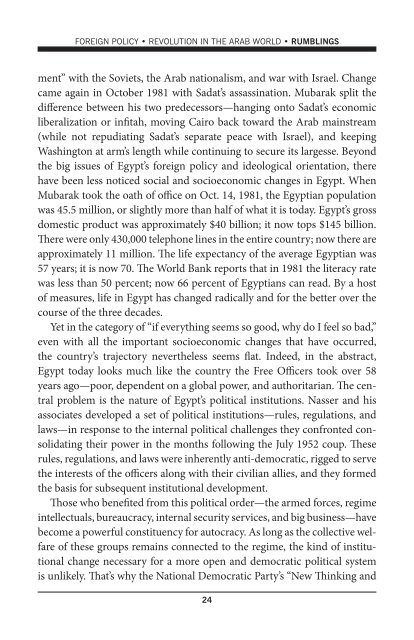Revolution in the Arab World - Observation of a lost soul Blog
Revolution in the Arab World - Observation of a lost soul Blog
Revolution in the Arab World - Observation of a lost soul Blog
You also want an ePaper? Increase the reach of your titles
YUMPU automatically turns print PDFs into web optimized ePapers that Google loves.
foreign policy • revolution <strong>in</strong> <strong>the</strong> arab world • rumbl<strong>in</strong>gs<br />
ment” with <strong>the</strong> Soviets, <strong>the</strong> <strong>Arab</strong> nationalism, and war with Israel. Change<br />
came aga<strong>in</strong> <strong>in</strong> October 1981 with Sadat’s assass<strong>in</strong>ation. Mubarak split <strong>the</strong><br />
difference between his two predecessors—hang<strong>in</strong>g onto Sadat’s economic<br />
liberalization or <strong>in</strong>fitah, mov<strong>in</strong>g Cairo back toward <strong>the</strong> <strong>Arab</strong> ma<strong>in</strong>stream<br />
(while not repudiat<strong>in</strong>g Sadat’s separate peace with Israel), and keep<strong>in</strong>g<br />
Wash<strong>in</strong>gton at arm’s length while cont<strong>in</strong>u<strong>in</strong>g to secure its largesse. Beyond<br />
<strong>the</strong> big issues <strong>of</strong> Egypt’s foreign policy and ideological orientation, <strong>the</strong>re<br />
have been less noticed social and socioeconomic changes <strong>in</strong> Egypt. When<br />
Mubarak took <strong>the</strong> oath <strong>of</strong> <strong>of</strong>fice on Oct. 14, 1981, <strong>the</strong> Egyptian population<br />
was 45.5 million, or slightly more than half <strong>of</strong> what it is today. Egypt’s gross<br />
domestic product was approximately $40 billion; it now tops $145 billion.<br />
There were only 430,000 telephone l<strong>in</strong>es <strong>in</strong> <strong>the</strong> entire country; now <strong>the</strong>re are<br />
approximately 11 million. The life expectancy <strong>of</strong> <strong>the</strong> average Egyptian was<br />
57 years; it is now 70. The <strong>World</strong> Bank reports that <strong>in</strong> 1981 <strong>the</strong> literacy rate<br />
was less than 50 percent; now 66 percent <strong>of</strong> Egyptians can read. By a host<br />
<strong>of</strong> measures, life <strong>in</strong> Egypt has changed radically and for <strong>the</strong> better over <strong>the</strong><br />
course <strong>of</strong> <strong>the</strong> three decades.<br />
Yet <strong>in</strong> <strong>the</strong> category <strong>of</strong> “if everyth<strong>in</strong>g seems so good, why do I feel so bad,”<br />
even with all <strong>the</strong> important socioeconomic changes that have occurred,<br />
<strong>the</strong> country’s trajectory never<strong>the</strong>less seems flat. Indeed, <strong>in</strong> <strong>the</strong> abstract,<br />
Egypt today looks much like <strong>the</strong> country <strong>the</strong> Free Officers took over 58<br />
years ago—poor, dependent on a global power, and authoritarian. The central<br />
problem is <strong>the</strong> nature <strong>of</strong> Egypt’s political <strong>in</strong>stitutions. Nasser and his<br />
associates developed a set <strong>of</strong> political <strong>in</strong>stitutions—rules, regulations, and<br />
laws—<strong>in</strong> response to <strong>the</strong> <strong>in</strong>ternal political challenges <strong>the</strong>y confronted consolidat<strong>in</strong>g<br />
<strong>the</strong>ir power <strong>in</strong> <strong>the</strong> months follow<strong>in</strong>g <strong>the</strong> July 1952 coup. These<br />
rules, regulations, and laws were <strong>in</strong>herently anti-democratic, rigged to serve<br />
<strong>the</strong> <strong>in</strong>terests <strong>of</strong> <strong>the</strong> <strong>of</strong>ficers along with <strong>the</strong>ir civilian allies, and <strong>the</strong>y formed<br />
<strong>the</strong> basis for subsequent <strong>in</strong>stitutional development.<br />
Those who benefited from this political order—<strong>the</strong> armed forces, regime<br />
<strong>in</strong>tellectuals, bureaucracy, <strong>in</strong>ternal security services, and big bus<strong>in</strong>ess—have<br />
become a powerful constituency for autocracy. As long as <strong>the</strong> collective welfare<br />
<strong>of</strong> <strong>the</strong>se groups rema<strong>in</strong>s connected to <strong>the</strong> regime, <strong>the</strong> k<strong>in</strong>d <strong>of</strong> <strong>in</strong>stitutional<br />
change necessary for a more open and democratic political system<br />
is unlikely. That’s why <strong>the</strong> National Democratic Party’s “New Th<strong>in</strong>k<strong>in</strong>g and<br />
24




